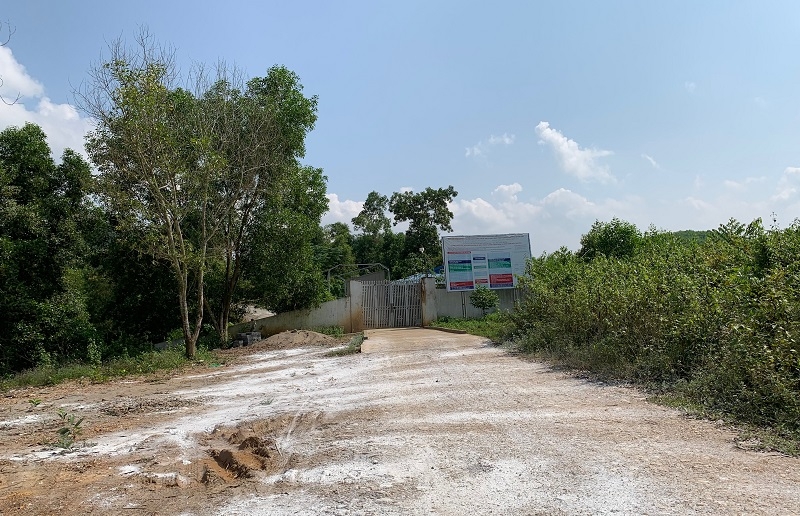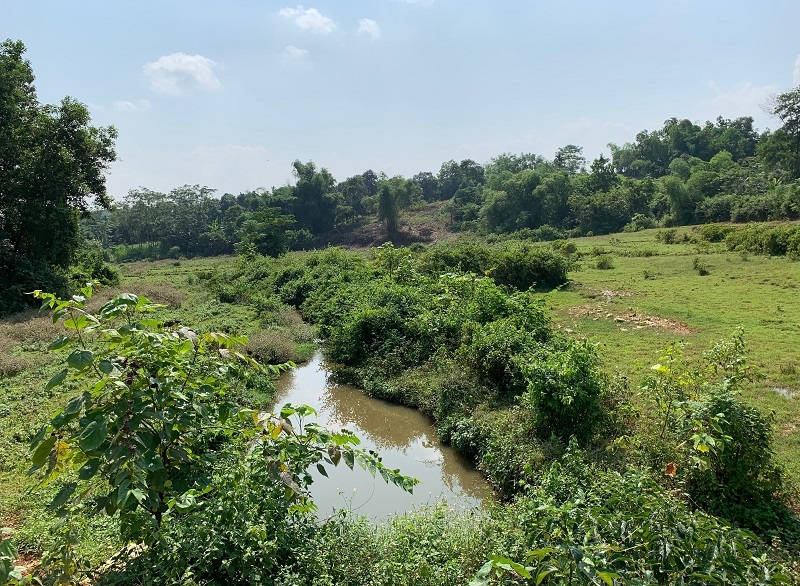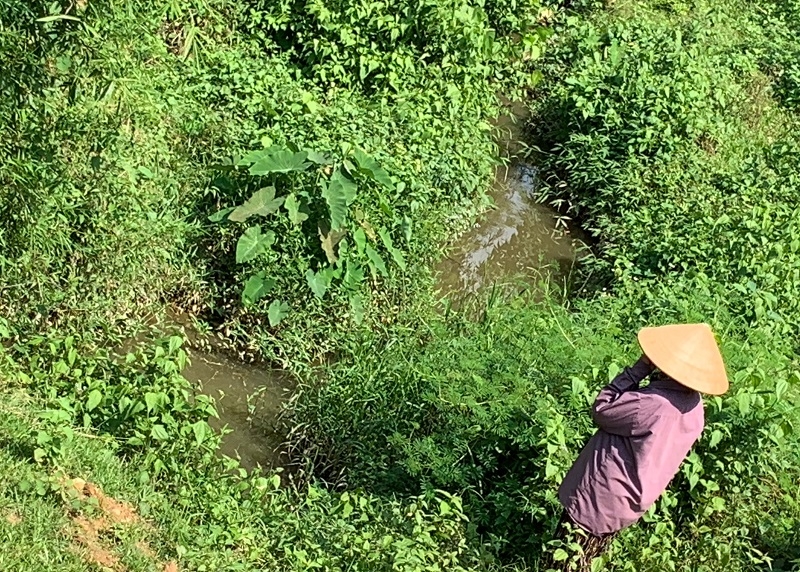Disgruntled residents demand regulation crackdown on pig farm wastewater activities
 |
Arriving to Huyen Y pig farm in Ky Son district in the northern province of Hoa Binh, VIR reporters were stunned by the stench wafting form the surrounding fields and drains. With both the sewers and the surrounding streams polluted, residents have no choice but to use this water to irrigate their fields, which has killed off all rice and other grain on the fields of the dozens of farming households in Phu Minh and Hop Thinh wards.
A female farmer living not far from the pig farm told VIR that local residents have been suffering from the pollution for a couple of years now. “After the pig farm was set up in 2017, our seasonal crops started to be impacted. At present, we harvest a single crop only, instead of two crops like before, but even this way the output is poor, only half or a third of what it was before the pig farm,” she said.
The pig farm has almost 10,000 pigs bred for Japfa Comfeed Vietnam Co., Ltd., a foreign-invested company based in Indonesia, specialising in producing animal feed and breeding livestock and poultry.
The company has three pig farms in this ward, and all of them have been reported for pollution of different severity, with the highest being the pollution of Song Da Water Investment JSC’s (Viwasupco) clean water reservoir feeding the inhabitants of the capital.
However, Nguyen Trong Le, chairman of Phu Minh ward, said that wastewater from pig farms cannot reach Dam Bai Pond, the clean water reservoir of Viwasupco, because the pond is very remote and separated by mountains and rough, dry terrain – and hilly land does not absorb water well. “Moreover, Song Da factory takes water about 4km upstream from the farms,” said Le.
Previously, Dung Huyen Japfa Comfeed 2 in the ward was reported for dumping pig manure on local fields, causing damage to residents. “We had to lead our cows to other places to feed because they would have gotten diarrhoea if they had eaten the grass there,” said a resident.
Discussing the cases with VIR, a representative of Japfa Comfeed said that the wastewater generated at every farm goes through a three-step filtration and treatment process from collecting tanks to regulating tanks, aerobic biological tanks, and sedimentation tanks before being discharged into the environment.
“Samples of the wastewater of these farms is also sent to an independent unit for testing every quarter, and its results are sent to the ward and district authorities,” the representative said.
The environmental impact assessment report outlined that “the wastewater from farming and pig manure is not harmful. The concentration of chemicals and waste in the wastewater is not high enough that it cannot be poured into the local sewage system.”
According to a local eyewitness, when he took a look in July at the third biological tank of this farm’s wastewater treatment system, which is the final stop before discharging into the environment, the water was still stinking green. This is usually discharged into the stream, polluting dozens of surrounding farming households.
 |
Unexpected result behind
The increase in the number of large-scale farms where for farming livestock groups outsource production has increased as they generate more benefits for farmers compared to developing small-scale farms.
Huyen Y and Dung Huyen are only two of the many outsourcing farms causing pollution across the country. This agricultural model first appeared in Vietnam more than 20 years ago with foreign groups specialising in producing animal feed and breeding livestock and poultry.
C.P. Vietnam and Japfa are the two largest outsourcers in Vietnam. Notably, C.P. Vietnam now has nine animal and aquaculture feed factories across the country. C.P. Vietnam has outsourced meat production to thousands of local farms. It cannot deny that this model helped change the face of the farming sector, generating jobs for locals and larger benefits for farm-owners than small-scale farming. Besides that, the establishment of large-scale farms has contributed to improving the efficiency of investment, exploitation, and use of bare land, bare hills, fallow land, and ponds.
However, the waste from thousands of pigs if not treated adequately can have a serious impact on the environment. Farms are legally obliged to have their environmental profiles approved, including the environmental impact assessment as well as the commitments and plans to protect the environment.
However, in reality, massive volumes of untreated wastewater are discharged into the environment across the country, with little action from authorities.
The south-central province of Ninh Thuan is another example. The province currently has 48 farms that have 30,000 pigs, and a throng of small-scale farms. After surprise inspections, local authorities found that almost all of these farms violate their legally binding commitments on wastewater treatment.
Notably, 22 farms lack a number of parts of their wastewater treatment system while the facilities at five farms were broken and four others had yet to complete their environmental profile.
Le Khac Huy Anh, deputy director of Ninh Thuan’s Department of Natural Resources and Environment, said that according to regulations, pig farms not only need to build a wastewater treatment system, they have to test air and wastewater samples every three or six months. However, almost all owners ignore this requirement.
 |
Calling for help
Over past years, residents living around pig farms have been calling for help from the media and authorities. Authorities issue fines, and the owners of the polluting farms promise to resolve the problems. However, many of them relapse or others step in to fill past offenders’ places.
The reason may be the neglect of the local authorities or that the fines are dwarfed by the profit the owners make. In May 2016, the Vietnam Environment Administration (VEA) under the Ministry of Natural Resources and Environment issued a fine of VND194 million ($8,440) and the suspended operations of a farm in Hoa Binh for three months for discharging pig manure into the environment.
Previously, VIR and a farm owner from Chuong My district of Hanoi calculated that a farm that has 1,000 pigs, each weighing 100kgs, may earn VND400 million ($17,400) a season (4-5 months), roughly half of which is profit. As the farm owner explained, most outsourcing farms have about 1,000-3,000 pigs. Thus, the VEA’s fine is not much of a deterrent.
The government affirmed that Vietnam will not sacrifice the environment for economic development. Thus, local authorities will have to deal thoroughly with violations, issuing fines that are big enough to be a deterrent.
What the stars mean:
★ Poor ★ ★ Promising ★★★ Good ★★★★ Very good ★★★★★ Exceptional
 Tag:
Tag:
Related Contents
Latest News
More News
- $100 million initiative launched to protect forests and boost rural incomes (January 30, 2026 | 15:18)
- Trung Nam-Sideros River consortium wins bid for LNG venture (January 30, 2026 | 11:16)
- Vietnam moves towards market-based fuel management with E10 rollout (January 30, 2026 | 11:10)
- Envision Energy, REE Group partner on 128MW wind projects (January 30, 2026 | 10:58)
- Vingroup consults on carbon credits for electric vehicle charging network (January 28, 2026 | 11:04)
- Bac Ai Pumped Storage Hydropower Plant to enter peak construction phase (January 27, 2026 | 08:00)
- ASEAN could scale up sustainable aviation fuel by 2050 (January 24, 2026 | 10:19)
- 64,000 hectares of sea allocated for offshore wind surveys (January 22, 2026 | 20:23)
- EVN secures financing for Quang Trach II LNG power plant (January 17, 2026 | 15:55)
- PC1 teams up with DENZAI on regional wind projects (January 16, 2026 | 21:18)






















 Mobile Version
Mobile Version